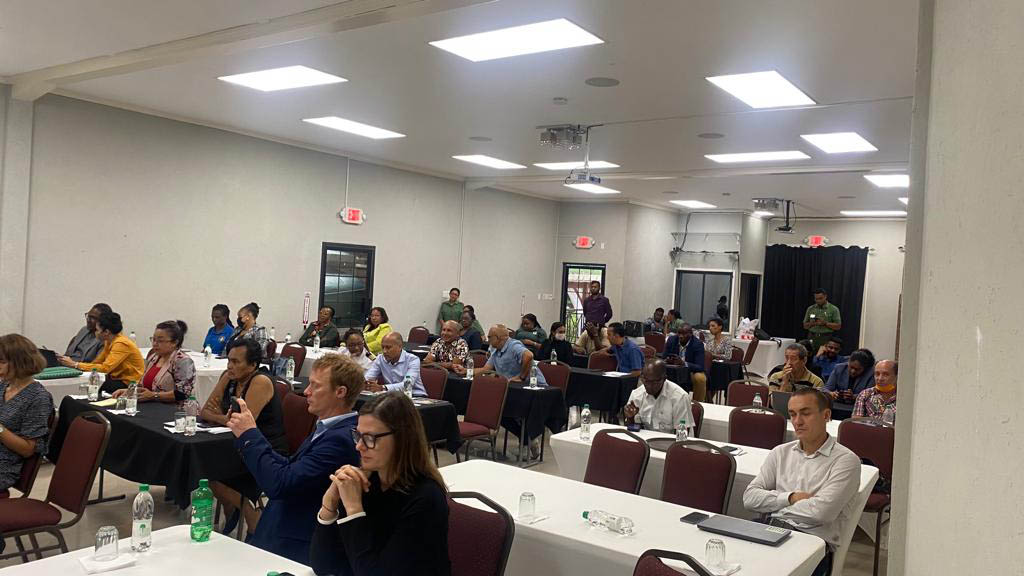A landmark agreement to improve forest governance and verify the trade in legal timber is set to be signed before the end of the year with the European Union (EU).
The signing will culminate a 10-year-long process.
The Ministry of Natural Resources in a release yesterday disclosed that representatives of Guyana and the EU held a meeting to discuss the implementation of their Voluntary Partner-ship Agreement (VPA) on Forest Law Enforcement, Governance and Trade (FLEGT). The release noted that the agreement will also focus on sustainable forestry.
During the meeting, the two entities expressed their intention to sign the Agreement before the end of 2022, the release added. After the VPA is signed and ratified, its commitments will become legally binding. The release added that the Parties intend to give high international visibility to such an important milestone, noting the groundbreaking and innovative nature of the Agreement.
According to René Van Nes, Ambassador of the European Union to Guy-ana, “The VPA spearheads Guyana as a global pioneer of sustainable forest management.”
According to the release, the signing and subsequent ratification of the VPA will mark the end of a 10-year negotiation process. As a result, Guyana will thereupon join a select group of Asian, African and American countries committed to the protection of their forests and will also become the first VPA country in the Amazon region, and the second in the Americas, after Honduras. This will place the nation as a frontrunner in sustainable forest management, adhering to the highest international standards.
“Through the VPA’s implementation, Guyana will further strengthen the sustainable use of its forest resources, reduce illegal timber trade and better modernise timber operations, thereby ensuring that forestry brings green jobs in the formal economy. The VPA also includes commitments to improve transparency, accountability, legislative clarity and other aspects of governance,” the release noted.
Minister of Natural Resources, Vickram Bharrat, who was present at the discussion stated, “The pre-JMRC [Joint Monitoring and Review Committee] meetings continue to highlight Guyana’s continued commitment to the VPA process and the broader initiatives to improve forest governance.” He added that the VPA and the agreements reached are all part of the government’s commitment under the Low Carbon Development Strategy 2030 aimed at promoting a green economy.
Good governance of Guyana’s forests, the release posited, is “crucial” to sustainable development. Moreover, “it helps both Guyana and the EU contribute to achieving the Sustainable Development Goals, including by mitigating climate change and protecting biodiversity.”
The Parties have agreed to focus their efforts on the further development and implementation of strengthened operational procedures for the sector, and a robust paper-based and digital traceability system of logs and timber that meets the VPA’s requirements. To ensure these priorities will be met in time, Guyana and the EU agreed on a detailed workplan. The Parties also discussed how they will continue to engage with national and international stakeholders interested in VPA implementation. They committed to putting in place a range of tools to ensure that interested audiences can follow the developments and impacts of VPA implementation.
Also present at the meeting were representatives of the private sector and civil society, including Indige-nous peoples’ organisations. They presented the issues they thought should be brought to the table. In addition, Guyana and the EU also discussed next steps in the development of an approach to protect the traditional rights of Amerindian peoples.
The next meeting of the Joint Monitoring and Review Committee, which reviews progress of the implementation of the Guyana-EU FLEGT VPA, is scheduled to take place in May 2023.
Guyana and the EU negotiated the terms of the VPA through a cooperative process: both Parties share the goal of fostering good forest governance and addressing illegality. These negotiations began in December 2012 and involved the private sector, government ministries and agencies, as well as Indigenous peoples. They were concluded in 2018 and initialled in November. After Guyana and the EU sign and ratify the VPA, its commitments will become legally binding and a joint Guyana-EU body will oversee the implementation of the VPA and respond to concerns as they arise. VPA implementation can therefore improve as it proceeds, the release added.





